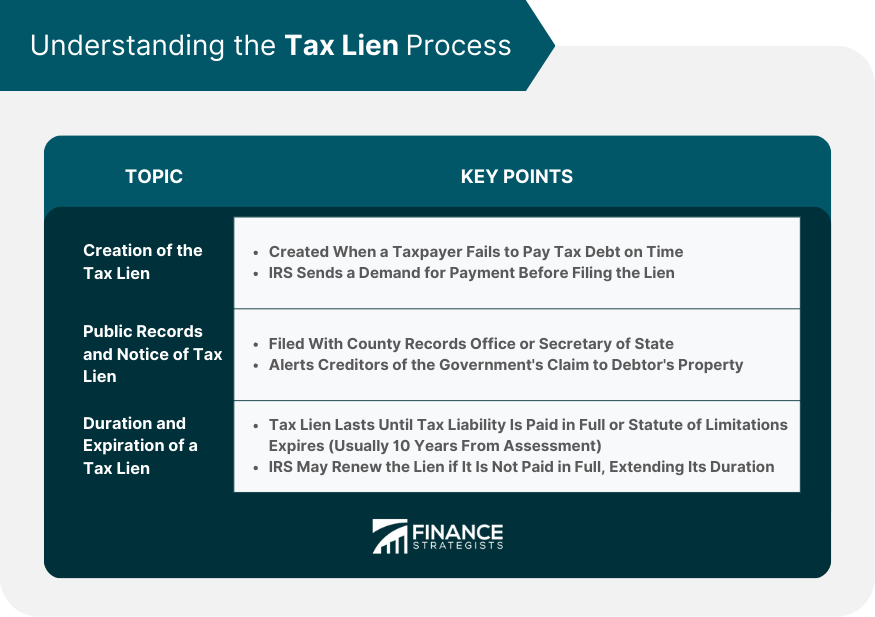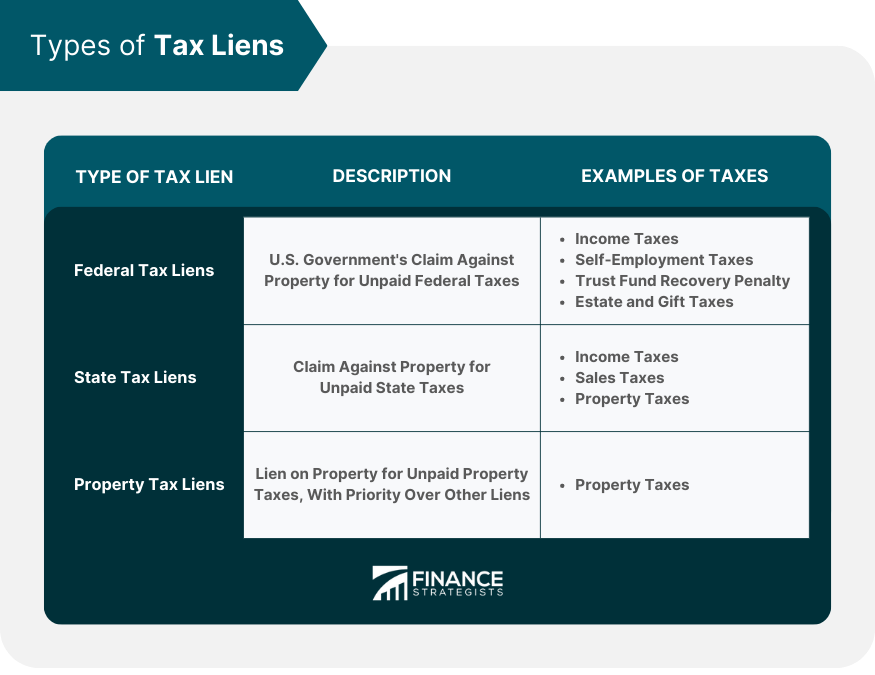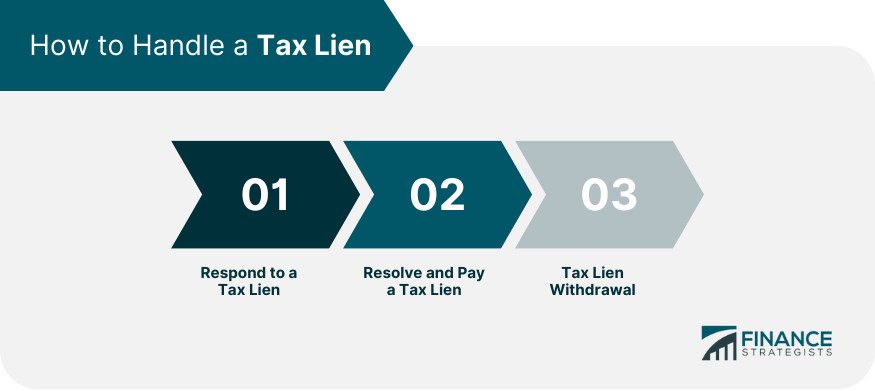A tax lien is a government's legal claim against a noncompliant taxpayer's assets to ensure tax payment. It arises when an individual or business fails to pay owed taxes. The lien is based on the government's right to claim property until the tax debt is paid. In the US, the federal tax lien is authorized by Section 6321 of the Internal Revenue Code. This provision states that if a person neglects or refuses to pay taxes after demand, the amount becomes a lien in favor of the United States on all their property and rights to property. The key parties involved are the government, as the lienholder with the right to claim the taxpayer's property, and the taxpayer, who owes the tax debt. A tax lien is created when a taxpayer fails to pay their tax debt on time. This non-payment prompts the government to file a public document, the Notice of Federal Tax Lien, to alert creditors that the government has a legal right to a debtor's property. It's important to note that before the lien is filed, the IRS will usually send a demand for payment, providing the taxpayer with an opportunity to pay their tax debt. The filing of a Notice of Federal Tax Lien is a public action. This notice is filed with the county records office or the Secretary of State, depending on the debtor's location. It serves as a public declaration of the government's claim against the debtor's assets, alerting other creditors of the government's legal claim to the debtor's property. The tax lien attaches to all of the taxpayer's property, including property acquired after the lien was filed. A tax lien lasts until the tax liability is paid in full or the statute of limitations on the debt expires, which is typically ten years from the date of assessment. However, there are instances where this period can be extended. If the lien is not paid in full, the IRS may renew it, effectively extending its duration. A federal tax lien is the U.S. government’s legal claim against your property when you fail to pay a tax debt. This lien applies to all properties owned by the taxpayer, whether real estate, personal property, or financial assets. Federal tax liens can be imposed for unpaid income taxes, self-employment taxes, the trust fund recovery penalty, and estate and gift taxes. A state tax lien, like a federal tax lien, is a legal claim against a taxpayer's property for unpaid state taxes. The process for implementing a state tax lien varies from state to state. Some states require court involvement, while others simply require filing a lien with the appropriate state office. State tax liens might arise from unpaid income taxes, sales taxes, or unpaid property taxes. Property tax liens are perhaps the most common type of tax lien. These liens are imposed on property owners who fail to pay their property taxes. If a property owner does not pay their property tax bill, the local government (county or municipal) may place a lien on the property. This type of lien is particularly noteworthy because, in many jurisdictions, property tax liens have priority over other liens, including mortgages. This means if the property is sold, the property tax lien gets paid before any other creditors get paid. One of the most immediate consequences of a tax lien is its negative impact on a debtor's credit score. A tax lien is considered a serious derogatory mark and can drastically decrease one's credit score. Tax liens are also public records, which means potential lenders or creditors can view them, and it could affect a person's ability to secure credit in the future. When a tax lien is placed on a property, it places restrictions on the sale of the property. The lien must be paid off before the title can be clear for transfer to a new owner. This means if the property is sold, the tax lien would need to be paid out of the sale proceeds before the remaining funds can go to the seller. Aside from credit and property ownership issues, tax liens can lead to other legal repercussions. In some cases, the government may choose to enforce the lien and seize property or assets to cover the tax debt. This can be done through a levy or a seizure. In more serious cases involving substantial tax debts, criminal charges may be considered. Upon receiving a notice of a tax lien, it's crucial to respond promptly. Ignoring the lien won't make it go away and can lead to further complications. Contacting a tax professional for guidance can be a good first step. They can help you navigate the tax code, understand your rights, and explore options for resolution. Paying the tax debt in full is the most straightforward way to resolve a tax lien. Once the debt is paid, the government will release the lien, typically within 30 days. If immediate payment isn't possible, other options include setting up a payment plan or an Offer in Compromise (OIC) where the IRS agrees to settle the debt for less than the amount owed. In some situations, bankruptcy can provide relief, although tax debts are often exempt from discharge. A tax lien withdrawal removes the public Notice of a Federal Tax Lien and assures that the government is not competing with other creditors for your property. However, you're still liable for the amount due. When taxes remain unpaid, one common way that municipalities recover their money is by selling tax liens to investors through an auction. During a tax lien sale, the government essentially sells the debt owed by the property owner to an investor. The investor then has the right to collect the debt, along with interest and penalties, from the property owner. Investing in tax liens can offer high interest rates, typically set by the law and ranging from 4% to 36%. Investors can purchase tax liens through public auctions, either live or online. It's crucial to conduct thorough due diligence on the property and understand the laws of tax lien investing in the specific jurisdiction. Tax lien investing can be rewarding, offering high interest rates and the possibility of acquiring the property if the lien isn't redeemed. However, it also comes with risks. If the property owner declares bankruptcy, the investor might not be able to collect their investment. The property itself may also be worthless. The most effective way to prevent a tax lien is to pay taxes on time. Whether it's property taxes, income taxes, or business taxes, staying current with your tax obligations can save you from the repercussions of a tax lien. Regular consultation with a tax professional can help in proper tax planning and ensure compliance with tax laws. Professionals can help you understand complicated tax laws, take advantage of tax credits and deductions, and create strategies to reduce tax liabilities. In cases where you believe the tax lien is filed by mistake, you can dispute it. The IRS provides a process to appeal the lien. It's advisable to seek legal help when disputing a tax lien, as the process can be complex. A tax lien is a legal claim made by the government on a taxpayer's assets due to unpaid taxes. The tax lien process begins with the creation of the lien, followed by its public notice, and ends with its duration and expiration. There are various types of tax liens, including federal, state, and property tax liens. To handle a tax lien, one must respond promptly, work towards resolving and paying the lien, and if necessary, seek its withdrawal. It is essential to prevent tax liens by paying taxes on time, consulting with a tax professional, and disputing any liens believed to be erroneous. If you find yourself confronted with tax lien issues, seeking professional tax planning services can be your best step forward.What Is a Tax Lien?
Understanding the Tax Lien Process
Creation of the Tax Lien
Public Records and Notice of Tax Lien
Duration and Expiration of a Tax Lien

Types of Tax Liens
Federal Tax Liens
State Tax Liens
Property Tax Liens

Consequences of a Tax Lien
Impact on the Debtor's Credit
Property Ownership and Sale Limitations
Legal Repercussions of Tax Liens
How to Handle a Tax Lien
Responding to a Tax Lien
Resolving and Paying a Tax Lien
Tax Lien Withdrawal

Tax Lien Sales and Investing
Introduction to Tax Lien Sales
How to Invest in Tax Liens
Risks and Rewards of Tax Lien Investing
Preventing Tax Liens
Importance of Timely Tax Payment
Legal Consultation and Tax Planning
Disputing a Tax Lien
Final Thoughts
Tax Lien FAQs
A tax lien is a legal claim made by the government against a noncompliant taxpayer's assets due to unpaid taxes.
A tax lien can significantly impact your credit score, making it difficult to secure loans or credit in the future.
Preventing a tax lien involves timely tax payment, proper tax planning, and disputing any tax assessments believed to be incorrect.
Yes, a tax lien can be removed or withdrawn once the tax debt is paid in full or settled through arrangements like an Offer in Compromise.
A federal tax lien applies to all assets and properties of a taxpayer due to unpaid federal taxes, while a property tax lien is specifically against a property due to unpaid property taxes.
True Tamplin is a published author, public speaker, CEO of UpDigital, and founder of Finance Strategists.
True is a Certified Educator in Personal Finance (CEPF®), author of The Handy Financial Ratios Guide, a member of the Society for Advancing Business Editing and Writing, contributes to his financial education site, Finance Strategists, and has spoken to various financial communities such as the CFA Institute, as well as university students like his Alma mater, Biola University, where he received a bachelor of science in business and data analytics.
To learn more about True, visit his personal website or view his author profiles on Amazon, Nasdaq and Forbes.















